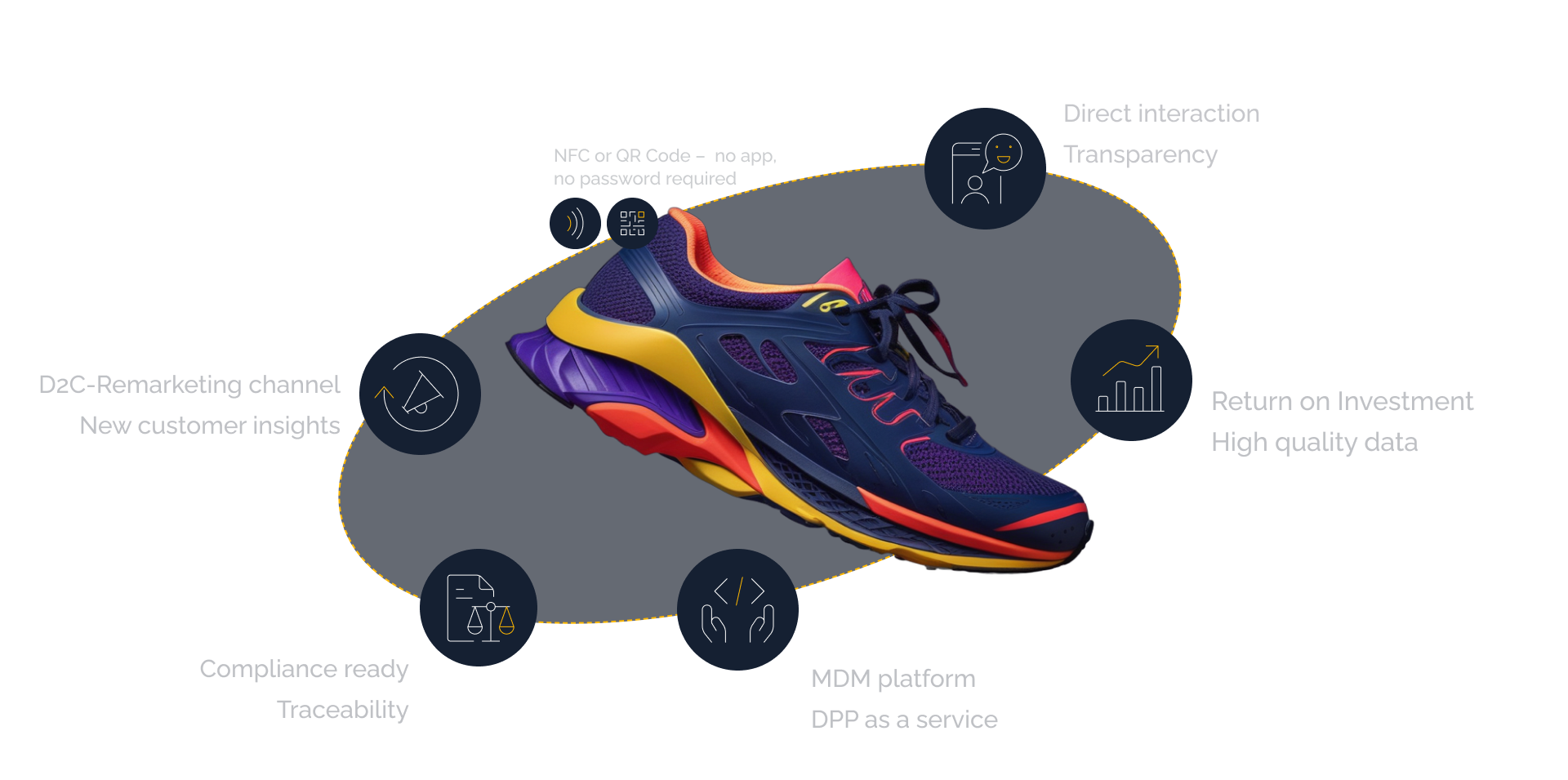This Digital Product Passport is a Game Changer
Register now for our free webinar! See our Digital Product Passport solution in action.
The Digital Product Passport serves as a digital record of a product’s lifecycle, supporting the European initiative to boost transparency and sustainability across supply chains. Acting now provides businesses with a significant competitive edge.
Why Act Now?
On July 18, 2024 the Ecodesign for Sustainable Products Regulation (ESPR) of the EU went into effect. By 2030 at the latest, all physical products sold in the EU must feature a Digital Product Passport (DPP).
While this might seem like a regulatory burden, it actually offers a significant opportunity for companies to gain a competitive edge.
With the right data and a customer-oriented, straightforward DPP solution, this can become a decisive competitive advantage. Join our webinar to see how.

The Challenges in Implementing the Digital Product Passport
Fragmented Data and Lack of Integration
Implementing the Digital Product Passport (DPP) requires coordinating data from various sources. Without a central data strategy, this can lead to data silos and inconsistencies, reducing efficiency and complicating the use of data for marketing and customer service.
High Costs and Lack of Return on Investment
Without strategic planning and integration of the DPP into the overall business strategy, implementation costs can quickly spiral out of control. A sole focus on compliance may lead companies to invest in costly, isolated systems that provide no additional benefits.
High Complexity and Immense Time Commitment
Implementing the DPP can be complex and requires careful coordination between various departments. Without clear planning and structure, this can lead to delays and additional time investment.
Inadequate Customer Experience and Brand Image
If the DPP is only seen as a compliance obligation, companies miss the opportunity to enhance the customer experience. Customers expect more transparency and valuable information about the products they purchase. A lack of focus on customer experience can negatively impact brand image.
Better Take the Holistic Approach
With PIM-To-DPP
Your Return on Invest Through a Completely New Customer Experience


If you don’t see a QR code, click here to open the product passport. For the best user experience, please open this page on your desktop computer and scan the QR code with your mobile phone.
From Duty to Beauty With Narravero
Narravero is the leading provider of DPP-as-a-Service, offering much more than just flawless documentation. Narravero transforms products into true brand ambassadors.
Narravero developed groundbreaking solutions well before the legal introduction of the DPP and is now the cross-industry market leader. Narravero CEO Thomas L. Rödding is an international DPP expert at DIN, DKE and CEN CENELEK. For companies of all sizes and industries: Turn duty (compliance) into beauty (customer loyalty).

All the Benefits of Our Solution
at a Glance

The Dpp is much more than just technology
Basilicom offers strategy consulting, concept and technical implementation for successfully launch the Digital Product Passport in your company. We align vision, data, and people.


The Most Important Questions and Answers About the Digital Product Passport
What is the Digital Product Passport (DPP)?
The Digital Product Passport (DPP) is a digital document that provides comprehensive information about a product throughout its entire lifecycle, including its manufacturing, usage, and disposal phases. By enhancing the transparency and traceability of products, the DPP promotes a circular economy. It provides crucial information about the material composition and recyclability of products, making it easier to reuse materials and reduce environmental impact, ultimately contributing to a more sustainable economy.
Why is the DPP important for companies now?
The DPP is vital for companies because it fosters transparency in supply chains and supports compliance with environmental standards. By implementing the DPP, businesses can demonstrate their responsibility for their products and their environmental impact. This enhances consumer trust and provides a competitive advantage. Moreover, the DPP helps companies meet legal requirements, such as the Supply Chain Act (Lieferkettengesetz), the ESPR, and the EU’s Green Deal, while positioning their brands as environmentally sustainable.
Which products are affected by the DPP regulation?
The DPP regulation applies to a wide range of physical products, including electronics, vehicles, construction materials, and consumer goods. The specific categories of affected products are determined by the EU and are regularly updated to reflect evolving technological and ecological standards. Companies should stay informed about the latest regulations to ensure compliance with DPP requirements for their products.
When will the DPP be introduced?
By 2030, all physical products in the European Union will need to have a Digital Product Passport (DPP). The phased introduction will allow businesses to adjust their systems and processes to ensure compliance with DPP requirements in a timely manner. The exact timelines and further deadlines will be established through EU directives and national laws.
What are the legal requirements for the DPP?
The legal requirements of the DPP mandate the provision of complete, accurate, and accessible product information at all times. These requirements are part of the EU's Green Deal initiatives and aim to promote the circular economy, transparency, and sustainability. Companies must ensure that their product data is regularly updated and meets legal standards to maintain compliance and avoid potential legal consequences.
How is the DPP linked to the Supply Chain Act?
The DPP helps ensure compliance with the Supply Chain Act (Lieferkettensorgfaltspflichtengesetz) by improving the transparency and traceability of materials across the entire supply chain. Through the detailed documentation of material origins and processing, companies can demonstrate that they are fulfilling their due diligence obligations in terms of human rights and environmental standards. This enables businesses to identify risks within the supply chain and take measures to prevent violations.
How can the DPP improve customer relationships?
The DPP enhances customer relationships by offering transparency and providing detailed information about products. Customers can access data on the origin, materials, and sustainability of products, building trust and increasing customer satisfaction. Additionally, businesses can use the DPP to offer relevant services, such as repair instructions and recycling information, which further strengthens customer loyalty.
What challenges do companies face when introducing the DPP?
The introduction of the DPP poses several challenges for companies, including ensuring high data quality, automating processes, and meeting stringent legal requirements. Companies may need to optimize their internal operations and possibly introduce new technologies and systems to comply with DPP demands. Careful planning and support from experienced partners can help overcome these challenges.
How can companies implement the DPP?
Companies can implement the DPP by developing a clear strategy based on modern data management systems like Product Information Management (PIM) and Master Data Management (MDM) — such as Pimcore. These systems help collect, manage, and regularly update product data centrally, ensuring compliance with DPP requirements. Close collaboration with specialized partners like Basilicom can facilitate the implementation process.
How can the DPP be integrated into existing IT infrastructure?
Integrating the DPP into existing IT infrastructures requires careful analysis and potentially adapting current systems. Companies should ensure their IT systems support DPP requirements and are capable of efficiently managing the necessary data. PIM and MDM systems can help ensure seamless integration. Pimcore is especially well-suited for the DPP. Technical support from experienced partners like Basilicom can also be crucial for successfully implementing the DPP into IT infrastructures.
Never miss a story
Subscribe to our newsletter